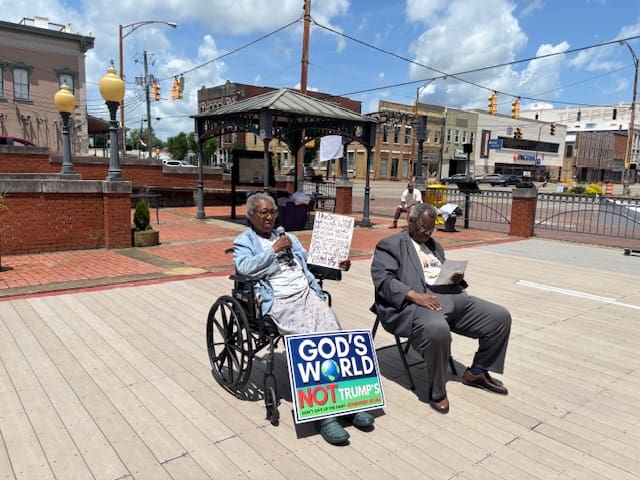Black Voices: News, Culture & Community from Across the Nation


Part of the No Kings Rally in Selma
Special to the Democrat by John Zippert, Co-Publisher
On Saturday, June 14, a multi-racial group of over one hundred people gathered on the west side of the Edmund Pettus Bridge in Selma for a ‘No Kings’ Rally to protest the actions of the Trump Administration that harm low- and moderate-income people and help the richest people in our nation. The rally was sponsored by the Save Ourselves Movement for Justice and Democracy (SOS), Alabama New South Coalition (ANSC), and Indivisible.
The Selma Rally was one of 13 events held in Alabama and among 2,100 held nationwide which involved 5 million people protesting Trump. This was the largest protest of an American President in history. It was held on the same day as Trump’s birthday parade in Washington D. C.
The focus of the rallies was opposition to Trump’s immigration and deportation policies; the budget cuts in his reconciliation bill on Medicaid, Medicare, SNAP (Food Stamp and Nutrition Programs), Education, Social Security, and other programs; as well as his attacks on Democracy, Voting Rights and the Rule of Law. Another criticism is Trump’s effort to cut the social safety for vulnerable people to give massive tax cuts to the top one percent of people, multi-millionaires and billionaires in our country.
Former State Senator Hank Sanders of Selma was the moderator of the No Kings Rally and said that the Selma site was chosen by the sponsors of the rally because of its historical significance to the enactment of the 1965 Voting Rights Act and the continuance of Democracy in the United States. ”We have no room for a dictator or a self-proclaimed king in America,” he said.
Isabella Compas of the Alabama Council for Immigrant Justice (ACIJ), who said she was a child of immigrants, spoke against the actions of the Trump Administration and ICE for rounding up undocumented people from farms, working places, churches, and schools who have committed no crimes. She said that families were separated, and people were sent to detention centers in deplorable conditions. Many have been deported without due process or the chance to get legal assistance. Trump is hurting the economy by taking workers out of the fields, processing plants, hotels and construction sites where they are working to support their families without providing replacement workers.
Martha Morgan, a retired University of Alabama law professor reported on the many legal challenges to the Trump Administration’s illegal and un-constitional actions. She reported that there are trackers on the Internet monitoring all of the legal actions against Trump. There have been 220 lawsuits so far, 73 have been successful at the initial level. Many are under appeal to appellate courts, and most may eventually reach the Supreme Court, which although aligned 6-3 with conservative members has decided some cases against Trump.
Another speaker was Annie Pearl Avery, a veteran SNCC civil rights worker, who march across the bridge on Bloody Sunday in 1965. She said, “We cannot give up fighting or Trump will set us back to before the Civil Rights Movement.”
Faya Rose Toure spoke at the rally holding some Confederate flags that the Daughters of the Confederacy had placed at public places. Faya Rose said she goes around pulling up the flags. “The Confederate flag is a symbol of defiance against the government. Trump would li8ke to take us back to slavery and Jim Crow. We are here today because we cannot allow him to take us back.”
John Zippert with SOS and the Greene County Health System Board of Directors spoke on the implications of the Trump Medicaid and Medicare budget cuts which will eliminate health care coverage for 15 million people and lead to the closure of many more rural hospitals.
Azali Fortier, a sophomore at Spellman College and native of Selma, spoke of the concerns of young people facing budget cuts in education for Pell Grants, scholarship, research grants and the banning of books about Black studies. “ We are also worried about the budget cuts on the safety net programs and the attacks on democracy,” she said.
Charles Flaherty of Marion, Alabama, said this was his first protest rally in fifty years, about the same basic democratic rights, but it will not be my last.
Near the end of the rally, Hank Sanders asked people at the rally to say where they were from and why they came. For half of the people, including some young people, said this was the first public political rally they had ever participated in. There were several Federal workers who were dismissed and others who were fearful of losing their jobs, under Trump’s directives. Several veterans in the group expressed that they were having problems with securing health care and other benefits from the Veterans Administration
At the end of the rally, the sponsors urged the attendees to call and write their Senators and Congresspersons about their concerns about budget cuts and attacks on democracy. People were urged to write letters to the editor of their local newspapers. The people were also urged to talk to their neighbors and friends about attending the next rally against Trump to make it even larger and more impactful.
The next rally in this series is scheduled for July 17, 2025, the “Good Trouble Lives On” to commemorate the work of the late congressman and Civil Rights leader, John Lewis, on the date of his death. The Transformational Justice Coalition will be the national sponsor. More information will be available on their website and the NoKIngs.org website as well.
Read the full article on the original publication


